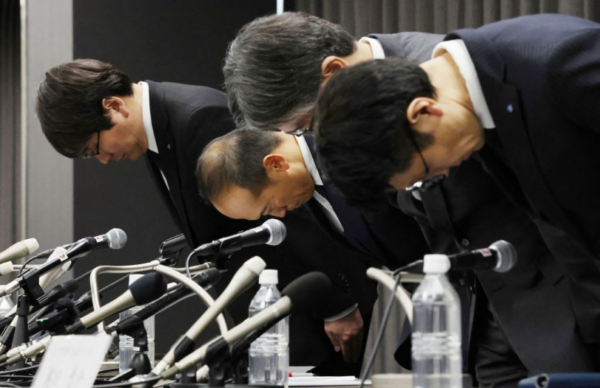Photo: Kobayashi Pharmaceutical Co. President Akihiro Kobayashi (2nd L) and others bow their heads at the beginning of a press conference in Osaka on March 29, 2024. A Japanese drugmaker whose dietary supplements are at the centre of a growing health scare reported on March 28 two more deaths potentially related to its tablets.
TOKYO – Five people who took a Japanese health supplement have died and more than 100 have been hospitalized as of Friday, a week after a pharmaceutical company issued a recall of the products, officials said.
Osaka-based Kobayashi Pharmaceutical Co. came under fire for not going public quickly with problems known internally as early as January. The first public announcement came March 22.
Earlier in the week, the number of deaths stood at two people. Company officials updated the number of dead to five Friday, and said 114 people were being treated in hospitals after taking products — including Benikoji Choleste Help meant to lower cholesterol — that contain an ingredient called benikoji, a red species of mold.
Some people developed kidney problems after taking the supplements, but the exact cause was still under investigation in cooperation with government laboratories, according to the manufacturer.
“We apologize deeply,” President Akihiro Kobayashi told reporters Friday, bowing for a long time to emphasize the apology alongside three other top company officials.
He expressed remorse to those who have died and have been sickened, and to their families. He also apologized for the troubles caused to the entire health food industry and the medical profession, adding that the company was working to prevent further damage and improve crisis management.
The company’s products have been recalled — as have dozens of other products that contain benikoji, including miso paste, crackers and a vinegar dressing. Japan’s health ministry put up a list on its official site of all the recalled products, including some that use benikoji for food coloring.
The ministry warned the deaths could keep growing. The supplements could be bought at drug stores without a prescription from a doctor, and some may have been purchased or exported before the recall, including by tourists who may not be aware of the health risks.
Some analysts blame the recent deregulation initiatives, which simplified and sped up approval for health products to spur economic growth.
“Buyer beware”
The scenario in Japan raises concerns for other markets, including the U.S., experts said.
“I believe it is likely that this particular problem affects products outside Japan as well,” said David Light, president and co-founder of Valisure, an independent lab that tests drugs for impurities and known for detecting carcinogens in products such as acne cream, sunscreen and the heartburn drug Zantec. He noted that supply chains for health and dietary supplements are similar to those for prescription drugs, with products manufactured in one country and then shipped to many geographic markets.
According to Kobayashi’s website, the company is working to increase sales of six brands including OTC pharmaceuticals in the U.S., China and Southeast Asia. Its U.S. subsidiary, Kobayashi Healthcare in Dalton, Ga., did not immediately return requests for comment.
“There is a place for supplements, but it’s a buyer beware situation,” said Dr. Tod Cooperman, president and founder of ConsumerLab.com, which tests supplements to determine their contents.
The Food and Drug Administration did not immediately respond to requests for comment.
When made properly, yeast grown on rice produces various compounds, including lovastatin, which is known to lower cholesterol, the physician said. “But if something goes wrong in production, you instead get citrinin,” a chemical linked to kidney toxicity in animals, Cooperman said.
Many people purchase dietary supplements and herbal medicines online or over the counter, assuming they are regulated like drugs. But the FDA does not verify supplements’ listed ingredients, and while federal law requires pharmaceuticals to meet specific standards, the rules are less stringent when it comes to supplements.
ConsumerLab.com last tested red yeast rice supplements in 2022, finding citrinin in 30% of the products tested, Cooperman said.
“One had 65 times the limit set in Europe,” he added, noting that the U.S. has not set a limit on the chemical.
Since lovastatin is classified as a drug, it is often left out as an ingredient by supplement makers looking to avoid the additional regulatory scrutiny.
When red yeast supplements became available in the U.S. more than two decades ago, they offered a less expensive option to prescription statins that were available over the counter. But it is difficult for consumers to verify a supplement’s ingredients, or determine if a product contains unlisted substances.
Consumers would be “better off going to a doctor and using a prescription cholesterol lower-er because there is more certainty as to what you’re getting,” Cooperman said. “[S]ome of the older statins are generic now, so it’s probably less expensive and safer to be buying a generic statin at this point.”
Meanwhile, he urges caution in taking supplements.
“There are a lot of brands out there that are more fly-by-night,” Cooperman said, “Our focus is on trying to find the best products. We’re finding one out of five products fail.”
AP/ CBS


Leave a Reply
You must be logged in to post a comment.